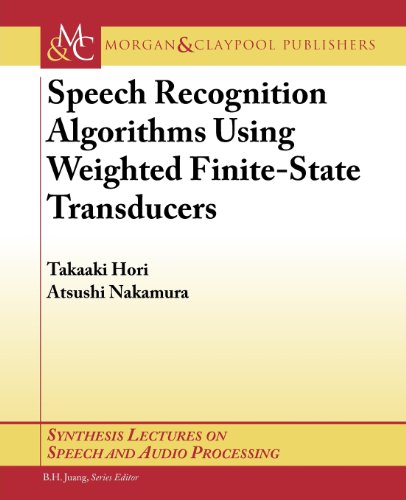Speech Recognition Algorithms Using Weighted Finite-State Transducers (Synthesis Lectures on Speech and Audio Processing, 10, Band 10) - Softcover

Inhaltsangabe
This book introduces the theory, algorithms, and implementation techniques for efficient decoding in speech recognition mainly focusing on the Weighted Finite-State Transducer (WFST) approach. The decoding process for speech recognition is viewed as a search problem whose goal is to find a sequence of words that best matches an input speech signal. Since this process becomes computationally more expensive as the system vocabulary size increases, research has long been devoted to reducing the computational cost. Recently, the WFST approach has become an important state-of-the-art speech recognition technology, because it offers improved decoding speed with fewer recognition errors compared with conventional methods. However, it is not easy to understand all the algorithms used in this framework, and they are still in a black box for many people. In this book, we review the WFST approach and aim to provide comprehensive interpretations of WFST operations and decoding algorithms to help anyone who wants to understand, develop, and study WFST-based speech recognizers. We also mention recent advances in this framework and its applications to spoken language processing. Table of Contents: Introduction / Brief Overview of Speech Recognition / Introduction to Weighted Finite-State Transducers / Speech Recognition by Weighted Finite-State Transducers / Dynamic Decoders with On-the-fly WFST Operations / Summary and Perspective
Die Inhaltsangabe kann sich auf eine andere Ausgabe dieses Titels beziehen.
Weitere beliebte Ausgaben desselben Titels
Suchergebnisse für Speech Recognition Algorithms Using Weighted Finite-State...
Speech Recognition Algorithms Using Weighted Finite-State Transducers (Synthesis Lectures on Speech and Audio Processing)
Anbieter: WeBuyBooks, Rossendale, LANCS, Vereinigtes Königreich
Zustand: Very Good. Most items will be dispatched the same or the next working day. A copy that has been read, but is in excellent condition. Pages are intact and not marred by notes or highlighting. The spine remains undamaged. Artikel-Nr. wbb0022371858
Gebraucht kaufen
Versand von Vereinigtes Königreich nach USA
Anzahl: 1 verfügbar
Speech Recognition Algorithms Using Weighted Finite-State Transducers
Anbieter: BookOrders, Russell, IA, USA
Soft Cover. Zustand: Good. Ex-library with the usual features. Library label on front cover. The interior is clean and tight. Binding is good. Cover shows very light wear. Ex-Library. Artikel-Nr. 122027
Gebraucht kaufen
Versand innerhalb von USA
Anzahl: 1 verfügbar


